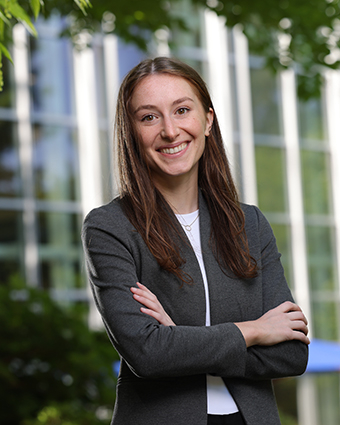Kelly Keglovits '23 awarded Duke Law's Keller Fellowship
Keglovits, who wants to pursue a career in reproductive rights, will receive financial support to work for nonprofit group Pregnancy Justice in North Carolina and South Carolina for one year.
 Kelly Keglovits
Kelly Keglovits
Kelly Keglovits ’23 has been awarded Duke Law School’s Keller Fellowship, which provides financial support to a graduating student to work in a public interest organization for one year.
Keglovits will work in North Carolina and South Carolina with Pregnancy Justice, a nonprofit that defends the rights of pregnant people against state control and criminalization. The group, which was previously known as National Advocates for Pregnant Women, represents people charged with crimes because of pregnancy or any pregnancy outcome — including birth, miscarriage, stillbirth, and abortion — and also engages in impact litigation, mobilization and public education, and research.
“When I entered law school, I knew this was what I wanted to do,” Keglovits said. “I came to Duke Law wanting to pursue a career in reproductive rights and the Keller Fellowship is allowing me to do that.”
Keglovits traces her interest in reproductive rights to seeing restrictions on abortion enacted in Oklahoma, where she grew up, and Texas, where she attended college. The Supreme Court’s decision last summer in Dobbs v. Jackson Women’s Health Organization, which overturned Roe v. Wade, only raised the stakes for her, she said.
“The injustice of it all has really stood out to me because it affects the places that raised me and that I love. And even here, this is the place that raised my legal career, so I want to do work here that gives back.”
After her first year of law school, Keglovits had a summer internship with the American Civil Liberties Union of Oklahoma, followed by a 2L externship with Planned Parenthood South Atlantic. She spent last summer at the Center for Reproductive Rights in New York, where she worked on challenges to state abortion restrictions passed after the Dobbs ruling, including one that secured a preliminary injunction against a fetal personhood law in Arizona.
At Duke, Keglovits has been an active member of If/When/How: Lawyering for Reproductive Justice and the Coalition Against Gendered Violence. Her December 2022 note for the Duke Journal of Constitutional Law and Public Policy argued for the application of principles of international human rights law to abortion rights advocacy in the wake of Dobbs. She has also been a student-attorney in the Health Justice Clinic and Wrongful Convictions Clinic, which she described as her favorite classes.
“In the Health Justice Clinic, Kelly built strong relationships with her clients, showing great empathy and persistence, and demonstrated outstanding strategic thinking and analysis in a policy project centered on gender and sex markers for intersex people,” said Clinical Professor Hannah Demeritt, the clinic’s supervising attorney.
“Kelly’s dedication to social justice, especially reproductive rights, has been unwavering throughout law school. This dedication, along with her strong lawyering skills, make her a most deserving recipient of the Keller Fellowship, where she will continue to be an asset in the fight for reproductive rights.”
The Keller Fellowship, one of three year-long paid fellowships Duke Law offers to students pursuing public interest careers, is named in honor of John Keller ’87, a lawyer with Legal Aid of North Carolina for over 35 years and was initially funded by members of his graduating class. Awarded annually, it enables fellows to work with a host organization doing domestic legal work in the United States with their salary and benefits paid by the Law School. Fellowships doing civil legal work for low-income or indigent clients, particularly work that addresses issues related to eliminating poverty, are preferred.
“Kelly came to law school tenaciously committed to reproductive rights and has dedicated every academic, extracurricular, and pro bono choice to better her skills and expertise towards that goal,” said Bethan Eynon, director of public interest careers. “This fellowship not only gives her a key opportunity to contribute to change as a new attorney, but it gives the reproductive rights movement an exceptional new advocate. As we talked over time about where she wanted to start her career, she always focused on organizations that served those most in need.”